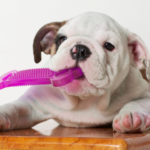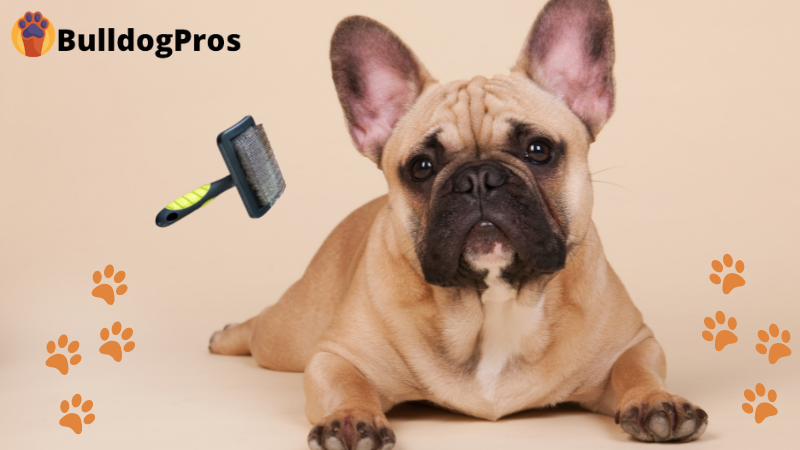In When do Puppies Stop Teething? A Guide To Your Puppy’s Teeth, we’ll discuss teething symptoms, the timeline of teething, and some tips to help ease teething discomfort for both you and your puppy. We hope this information will help make teething more bearable for everyone involved!
When Do Puppies Start Teething?

Puppies usually start teething when they are around six weeks old. The baby teeth will begin to come in, and the puppy will start chewing on objects and biting things. They may also begin licking their gums excessively. This is a normal process that puppies go through to develop their teeth and gums.
Puppy Teething Timeline
A puppy’s teeth come in two distinct phases; the first set of incisors and canines appears before 12 weeks. They can begin to come in as early as two weeks of age. There are a total of 24 baby teeth.
When a puppy is about 3-to-4-months-old, the baby teeth begin to fall out to make room for 42 adult permanent teeth.
Once your puppy is 6-months-old, his baby teeth should have fallen out and his second set or your puppy’s adult teeth make their appearance.
By the time dogs are seven or eight months old, they should have all of their adult teeth, and teething should stop. Some dogs will continue to chew until they are one year old. Teething is over once all of the adult teeth are in and the gums have finished adjusting.
Dogs should have all of their adult teeth by the time they are seven or eight months old, and teething should stop. However, some pups chew for up to a year. Once the adult teeth have fully erupted, teething is done.
Symptoms of Teething
Some of the most common puppy teething symptoms seen are chewing on their paws, chewing on objects like toys or bones, and drooling excessively.
If your pup seems to be in a lot of pain, a trip to the vet might be needed. However, most of the time, the puppy will come through with flying colors.
How To Help Your Puppy Get Through Teething
There are some simple tips that you can follow to help you and your puppy handle teething. For example, provide your puppy with safe chew toys that are durable and will keep them occupied.
Be sure to give your puppy a toy that is the right size and chewing material for his age. It’s important to avoid giving him toys with metal parts, plastic pieces, or anything that could be dangerous if swallowed. And lastly, make sure not to provide him with a toy that is too hard or soft, as this could lead to injuries.
Rubbing his gums with ice can help soothe his sore gums. You can even freeze some chew toys to give the same effect.
How Do You Stop A Teething Puppy From Biting?

If you’ve ever had a puppy bite your fingers or toes, you know how sharp puppy teeth can be. There is no one-size-fits-all answer to how to stop a puppy from biting because it can vary depending on the individual puppy’s temperament and chewing habits.
A common occurrence is while playing with your pup, he’ll start nibbling at your fingers or toes. This is when having a toy nearby comes in handy to offer a suitable replacement and divert his attention. Diversion is an excellent way to train your pup to know that it is not acceptable to bite or nipple.
If after trying to divert his attention and he continues to bite, putting him in his kennel/crate until he calms down can be effective.
Never hit your dog or otherwise physically punish him for this behavior.
Brushing Routine

There are many ways to brush your dog’s teeth at home, but the most effective method varies depending on the breed and size. You can use a toothbrush with soft bristles or a rubber ducky-style scrubber.
Make sure to apply toothpaste specifically designed for dogs in an appropriate amount — just enough to cover the entire surface of his teeth. Since it may include elements like xylitol, which is harmful or even deadly to dogs, DO NOT utilize human toothpaste.
The American Dental Association recommends brushing a dog’s teeth every day, but for puppies under six months of age, every other day.
When brushing his teeth, be gentle and avoid excessive force; you don’t want to cause any rips in his gums or damage the tooth enamel.
You also might be interested in reading: How To Potty Train an English Bulldog Puppy
Popular Articles:
Conclusion
By following the tips mentioned in this blog, When do Puppies Stop Teething? A Guide To Your Puppy’s Teeth, you can help you and your puppy get through teething.
Providing a suitable chew toy can help your pup from chewing on inappropriate objects.
Be sure to consult with your veterinarian if your puppy is teething excessively or if his teeth are coming in an abnormal way.
Teething puppies can be a bit of a challenge, but with patience and a few calming techniques, everything will eventually be okay!
How have you dealt with a teething puppy? Please comment below.



